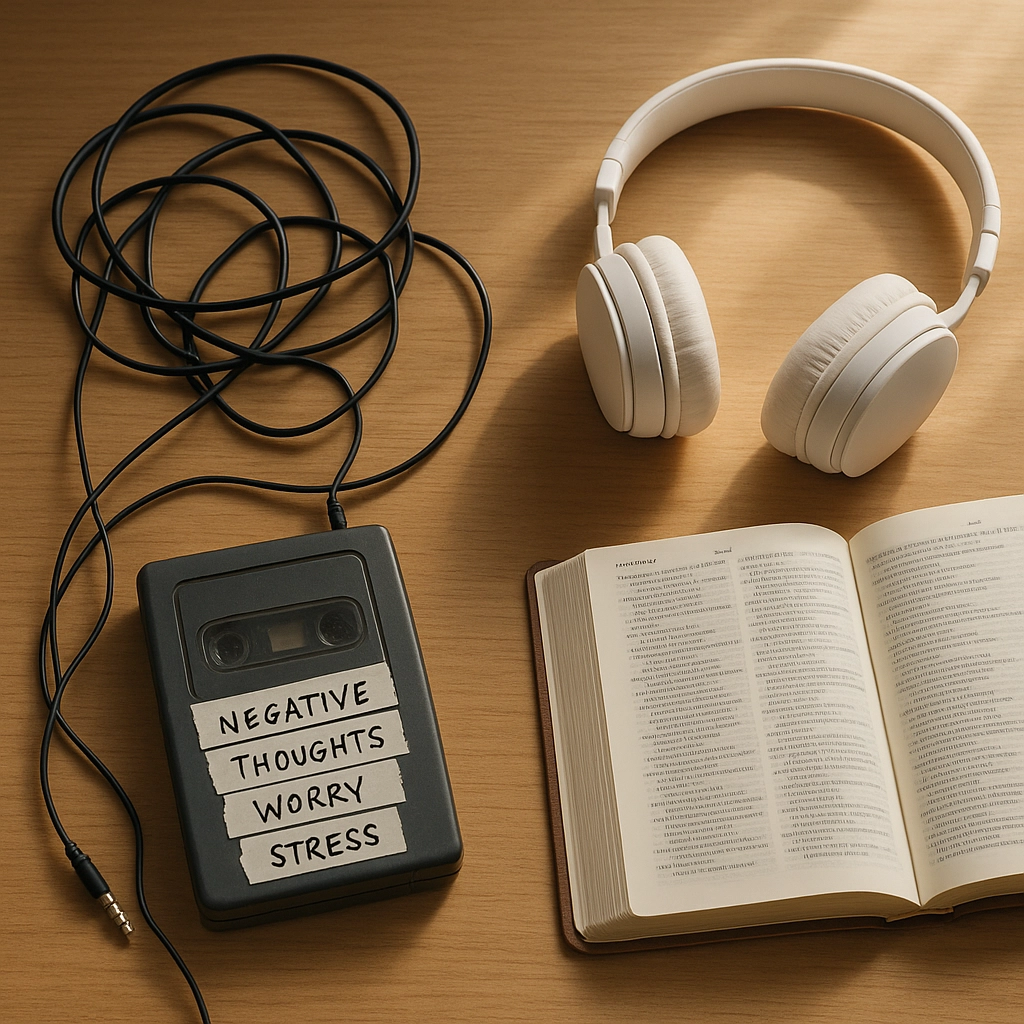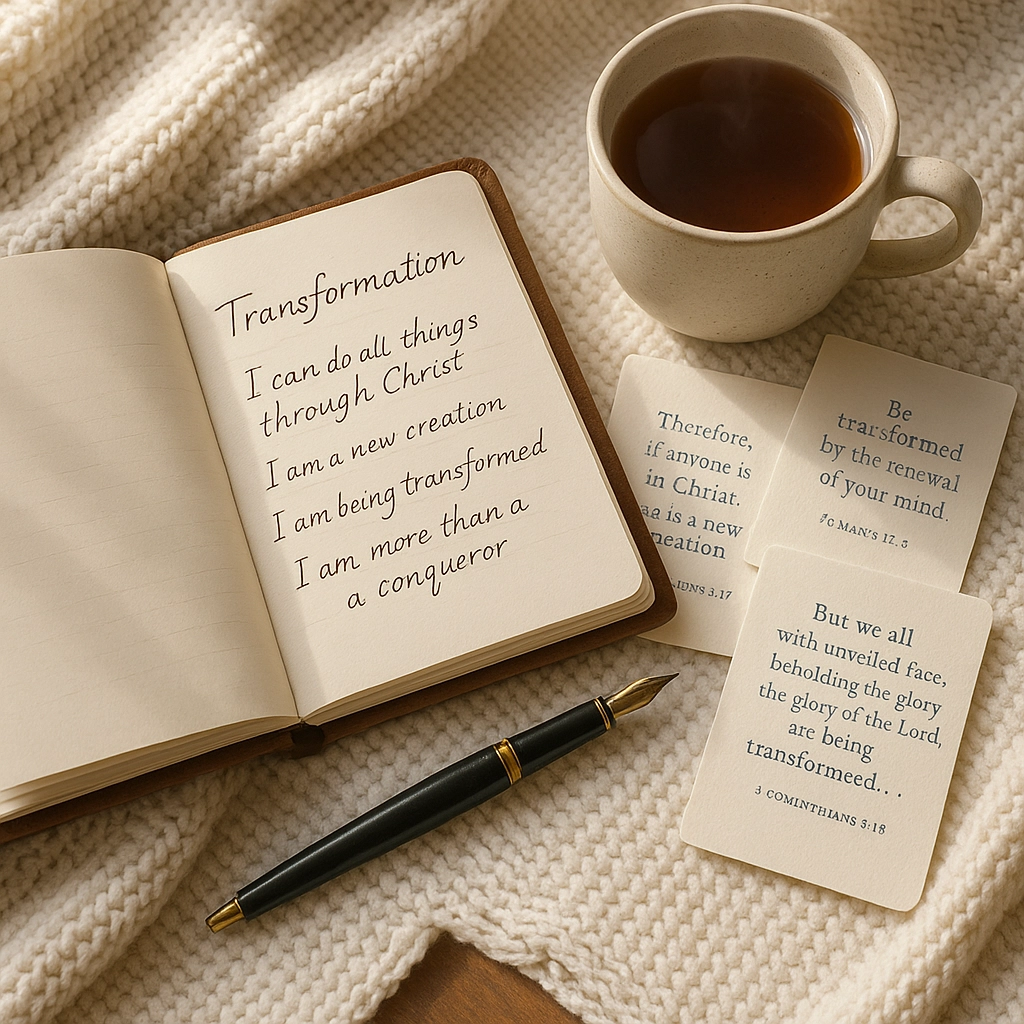
What If the Voice in Your Head Isn't Telling You the Truth?
Have you ever noticed how the soundtrack playing in your mind rarely matches what you'd say to someone you love?
That internal narrator—the one that whispers you're not enough when you look in the mirror, or you'll never change when you make a mistake—has been composing melodies of doubt for so long that you've started humming along without even realizing it.
You're not alone. We all carry these soundtracks, these loops of lies so familiar they feel like truth. They play softly in the background of our days, influencing decisions, dampening joy, and shaping how we see ourselves. The most dangerous lies aren't the ones others tell us—they're the ones we've memorized and repeat to ourselves.
The Soundtrack Problem
Think about your favorite song. The one you know every word to. The one that, when it comes on, you can't help but sing along.
That's what happens with our internal dialogue. After years of replay, these thoughts become automatic:
I'm always going to struggle with this.
People like me don't succeed at things like that.
God might love everyone else, but He's disappointed in me.
I've made too many mistakes to start over.
These aren't random thoughts—they're a carefully curated playlist. And here's the problem: we weren't the ones who chose most of these songs.

When the World Writes Your Soundtrack
The world has been programming your internal playlist since before you could speak. Family dynamics, childhood wounds, school experiences, social media, cultural messages—all feeding you lyrics about who you are and what you're worth.
Even well-meaning voices can contribute to this soundtrack:
- The teacher who said "you need to try harder" (translated by your heart into I'm not smart enough)
- The parent who wanted you to succeed (interpreted as my value comes from achievement)
- The friend who seemed to have it all together (reinforcing everyone else has figured this out except me)
The most insidious part? Eventually, you become the main composer, continuing to write verses that reinforce what you've always heard.
But here's the truth that changes everything:
You don't have to keep listening to a soundtrack you didn't choose.
The Divine Sound Engineer
"See, I am doing a new thing! Now it springs up; do you not perceive it?" (Isaiah 43:19)
What if God is the ultimate sound engineer, waiting for permission to remix the soundtrack of your heart? Not with temporary positive thinking or shallow affirmations, but with eternal truths that were written about you before you took your first breath.
This isn't about slapping a spiritual Band-Aid on deep wounds. It's about the radical act of replacing lies with the truth of who God says you are—and letting that truth play on repeat until it becomes more familiar than the lies ever were.

Why Lies Stick (And Truth Sometimes Doesn't)
Our brains have a negativity bias—we're wired to remember criticism more than praise, threats more than opportunities. Neuroscience confirms what many of us experience: negative thoughts stick like Velcro, while positive thoughts slide off like Teflon.
That's why simply hearing the truth once isn't enough. Your brain formed neural pathways through years of repetition of the same thoughts. The good news? Neuroplasticity—your brain's ability to rewire itself—means you can create new pathways.
This is where FaithCards become powerful. They're not just nice sayings or motivational quotes—they're strategic tools for rewiring your inner soundtrack. Each card presents a specific truth designed to counter a specific lie that's been playing in your mind.
The FaithCards Method: From Lies to Truth
The process is simple but profound:
Identify the Lie
Before you can replace something, you need to recognize it. Start listening to your internal dialogue with curiosity rather than judgment.
Find the Truth
For every lie, there is a truth that directly counters it. Not a sugar-coated platitude, but a rock-solid reality from Scripture.
Create New Loop
Use FaithCards as your daily practice. Choose a truth and interact with it until it becomes more natural than the lies.
1. Identify the Lie
Before you can replace something, you need to recognize it. Start listening to your internal dialogue with curiosity rather than judgment. What themes do you notice? What phrases come up when you're stressed, disappointed, or facing challenges?
Common lies include:
- I am what I do (performance-based identity)
- I am what others think of me (approval-based identity)
- I am my worst mistake (shame-based identity)
- I am alone in my struggles (isolation-based identity)
2. Find the Corresponding Truth
For every lie, there is a truth that directly counters it. Not a sugar-coated platitude, but a rock-solid reality from Scripture:
Instead of "I'm never enough" → "I am complete in Christ" (Colossians 2:10)
Instead of "I'm too broken to be loved" → "Nothing can separate me from God's love" (Romans 8:38-39)
Instead of "My past defines me" → "I am a new creation" (2 Corinthians 5:17)
Instead of "I have to earn God's approval" → "I am already accepted" (Ephesians 1:6)
3. Create a New Soundtrack Loop
This is where FaithCards become your daily practice. Choose a truth that speaks to your particular struggle. Place it where you'll see it multiple times a day—bathroom mirror, phone lock screen, car dashboard.
But don't just read it—interact with it:
- Say it aloud
- Write it down
- Pray it back to God
- Meditate on what it means for your daily life
The goal isn't just to memorize words, but to internalize truth until it feels more natural than the lies ever did.

The Soundtrack Switch: A Practical Guide
Let's get practical about how to use FaithCards to rewrite your inner soundtrack:
Morning Reset:
Start your day by identifying a lie that's been playing. Choose a FaithCard with a truth that directly counters it. Read it aloud three times before your feet hit the floor.
Trigger Awareness:
Notice when your internal soundtrack gets especially loud. What triggers the volume? Criticism? Comparison? Mistakes? Keep the relevant FaithCard handy for these moments.
Truth Journaling:
When a lie surfaces, write it down. Then write the truth next to it. The physical act of writing helps your brain process and integrate the new narrative.
Scripture Meditation:
Don't just read the verse on your FaithCard—sit with it. Ask questions: What does this reveal about God's character? What does this mean for my identity? How would my day look different if I truly believed this?
Community Reinforcement:
Share your journey with trusted friends. Ask them to remind you of these truths when they hear you repeating the old soundtrack.
From One Song to a Symphony
Rewriting your inner soundtrack isn't about silencing all negative thoughts or achieving perfect self-talk. It's about creating space for God's voice to become louder than all the others.
Over time, something beautiful happens. The truths on your FaithCards begin to connect with each other, creating not just a new song but a rich symphony of identity. You start to see yourself as God sees you—not through the distorted lens of past wounds or present struggles.
This doesn't mean you'll never hear the old soundtrack again. But when those familiar melodies of doubt, shame, or fear start playing, you'll recognize them for what they are: echoes of an old song that no longer defines you.
Questions for Reflection
Take a moment to consider:
-
1
What's the most persistent lie in your internal soundtrack? Can you trace when you first started believing it?
-
2
Which truth from Scripture most directly counters that specific lie? If you don't know, what would it feel like to search for that truth?
-
3
How might your relationships, decisions, and daily peace change if God's truth about you became louder than everything else?
Sit with these questions. Journal about them. Pray through them. The awareness itself is the beginning of change.
A New Song Rising
Remember: this journey from lies to truth isn't about positive thinking or self-improvement. It's about aligning your heart with what's already true about you in God's eyes.
The old soundtrack didn't appear overnight, and neither will the new one. But each time you choose to listen to truth instead of lies, you're creating a path for freedom that grows wider with every step.
Your true identity is waiting to be discovered—or rather, remembered—one truth at a time.
Want to begin rewriting your inner soundtrack with biblical truth?
Explore God Says I Am ResourcesThe song of who you are has already been written. It's time to start listening.